News
News

Delivering NPP PayTo – Ultradata and Indue Collaboration
In the ever-evolving world of financial services, innovation driven by consumer demand and Australian-mandated obligations continue to be the driving force pushing our businesses forward.
The PayTo initiative is a key part of the New Payments Platform (NPP) that is set to modernise direct debits, provide an alternative to card payments, and give customers greater control over their payments.
The system is designed to allow customers to manage recurring payments in bank apps and pay directly via bank accounts, and is designed to reduce payment costs for retailers.
Innovative Insights | Outstanding Outcome
“We feel that there is a commitment between Indue and Ultradata to work together in a way that is genuine and positive. There are a number of projects either in place or coming up, that we are partnering with Indue for. This is the way to achieve the best results.”
David Rowe, Senior Manager of Business Solutions at Ultradata
Recently a collaborative effort between Ultradata and Indue was taken to start the journey of delivering the PayTo gateway to Indue’s NPP participating client base.
The key deliverables for the project were:
- Meeting the NPP mandate.
- Creating and developing the NPP PayTo solution.
- Integrating the solution into Ultradata and Indue’s systems.
There were three key partners involved in the delivery of the NPP PayTo software solution:
- Ultradata
- Indue
- BankVic
Ultradata, crafting a user-friendly interface: Ultradata’s responsibilities included designing and developing the user interface, and assuring that the end product delivered a solution that met the industry requirements and exceeded customer expectations.
Indue, the NPP participant: Indue possessing a direct relationship with NPP Australia (NPPA) was pivotal to delivering a seamless NPP PayTo ecosystem, and held the responsibilities of defining, testing, and certifying the solution’s readiness.
BankVic, the Early Adopter: Ultradata and Indue were looking for a mutual client that had the experience and strong technical capability to onboard as an early adopter. BankVic was identified as a bank that had the right operating environment and had the prerequisites required to navigate the complexities of an early adopter, and one that would be able to integrate the NPP PayTo software within its core banking system, comprehensively test the product, and validate its functionality and usability within a specific timeframe.
“As the early adopter, I have seen, at times, 3 or 4 developers jumping onto a call to help us to work through some of the issues. As the early adopter we had Ultradata’s full attention. It was a real benefit.”
Gaetan Thillou, Project Manager, BankVic
Harnessing Knowledge | Leveraging Strengths
Since May, rigorous testing has paved the way for the solution to go into production, covering user acceptance testing and several phases of industry-specified testing, including testing with other industry partners. There was a multitude of steps and processes taken to deliver each early adopter milestone that respectively were aimed at meeting the outlined key deliverables.
By leading the way as an early adopter, BankVic not only tested NPP PayTo’s functionality in real-world scenarios, but also played a part in shaping the product to the direct needs of their business and to be compliant to the NPP requirements.
The lessons learned from BankVic’s early adoption have provided a blueprint for a smoother and more effective adoption process for Ultradata’s and Indue’s other mutual clients.
“The beauty about being in the mutual space is that it is a collaborative community; everyone is helping each other, with the early adaptor role for each project being shared amongst the mutuals. It provides a lot of benefits across the community.”
Gaetan Thillou, Project Manager at BankVic
The teams worked together to draw on the strengths of each other to make the solution even more innovative. One of these was Indue’s creation of a Test Portal to allow both Ultradata and the client to “self-serve” their testing needs by being able to create and update mandates as the initiator. Another was the provision of more user friendly display text in the Indue messages that includes simplified language and structure which is ready to be displayed as-is to the end-customer, eliminating the need for extra client-side processing.
Remarkable Teamwork | Collaborative Spirit
Given the complexity and challenges involved in developing and designing an innovative solution such as NPP PayTo, collaboration was critical to achieving a successful outcome.
Throughout each stage of project delivery, the partners brought their PayTo expertise to help identify and anticipate potential risks and challenges, and develop strategies to manage them.
For example, while the end-user experience might appear straightforward, the backend workings are significantly complex, and there can be varied interpretations of technical requirements and regulations.
Using their years of experience with developing payments solutions, the team successfully navigated this complexity through effective communication, open discussions, and a commitment to building a shared understanding among the partners.
Having a team with the right combination of skills and expertise has reminded us that collaboration truly is the cornerstone of overcoming challenges in order to achieve milestones.
“Working on the PayTo project was a very rewarding and positive experience. The open and honest working relationship between the three parties meant we could navigate through the challenges and achieve a great outcome for all our organisations,”
Simon Bromage, Project Manager at Indue.
Reshaping Payments | Transforming Transactions
Ultradata, Indue, and BankVic have helped pave a way for a future where other financial institutions will be in a position to empower their customers with more control over their bills, and payments, and stand to benefit from the way customers like to do their banking.
“I would like to thank Indue, Ultradata and Experteq for supporting and helping us through the project. The shared commitment and willingness to work together in order to deliver a positive outcome for BankVic members, is particularly pleasing.”
BankVic’s Chief Information Officer, Shane Kuret
The NPP PayTo is a product ready to reshape payment management.
Article produced by Ultradata – September 2023.

From days to minutes: Payment services provider Indue accelerates its ability to innovate using Azure
Indue has been a significant player in Australia’s payments sector for more than 50 years. The payments technology provider is an Authorised Deposit Taking institution who specialises in helping organisations of all types adapt to and benefit from the latest innovations in payments technology.
Through its solutions – which encompasses everything from card management and mobile payments to direct entry transactions and real-time fraud detection – Indue aims to eliminate the need for multiple third-party engagements and streamline the payment system implementation process.
Indue is a founding member of Australia’s New Payments Platform (NPP), launched in February 2018 to modernise the nation’s payment infrastructure. The platform enables faster, more flexible and data-rich transactions to meet the evolving needs of Australian consumers, businesses and financial institutions.
Keith Bromwich, Head of Architecture at Indue, says Indue has helped clients adopt the NPP since its inception.

“Our role is to allow tier 2 and 3 financial institutions such as mutuals, regional banks and BAAS providers to access the NPP via our own platform,” he explains.
In June 2023, the NPP introduced PayTo, a new digital way for merchants and businesses to initiate real-time payments from their customers’ bank accounts. PayTo solves many existing challenges with direct debit payments, including processing delays, limited transaction information, and a lack of control for consumers and businesses over payments.
To ensure it could help clients adopt the new payment method, Indue embarked on an ambitious project in March 2022 to transform its technology infrastructure – largely made up of on-premise data centres – and adopt a more cloud-native approach.

In May 2022, Indue engaged Microsoft partner Arinco to help it develop enterprise-scale landing zones and a robust application programming interface (API) platform in Azure.
“The people we worked with at Arinco were absolute knowledge leaders,” says Bromwich. “They helped us make the right decisions by providing the pros and cons.”
Arinco used a flexible delivery approach to facilitate development timelines, which saw the first application landing zones for PayTo being implemented by early July 2022. This enabled Indue’s developers to build new capabilities for testing by October 2022.
As this was Indue’s first major deployment of modern web APIs in Azure, Arinco supported and educated Indue’s developers and engineers by leveraging its partnership with Microsoft.
“Firstly, we embedded consultants within Indue’s development teams, focusing on accelerating outcomes and providing best practice guidance for topics such as .NET development, Azure API deployment and security,” says James Westall, Account Executive at Arinco.
“Secondly, our consultants worked with Indue’s platform engineers, sharing our expertise with them as we developed code for each landing zone. This meant that at transition time, Indue engineers were starting from a solid knowledge base.
“Lastly, we partnered with Microsoft to deliver hands-on Azure Accelerate workshops. These covered key topics identified by Indue, enabling employees to get familiar with Azure in a safe environment with instructor guidance.”
The other challenge that Arinco helped Indue solve was the operational sign-off of its Azure capability.
“As an entity that’s regulated by the Australian Prudential Regulation Authority, Indue must be able to attest to the security, stability and robustness of its services,” explains Westall. “The deployment that we developed was designed to remain compliant using Azure and third-party security tools, including the capability to hold Payment Card Industry data.
“We also assisted Indue in developing several operational documents and procedures, ensuring key details about running solutions on Azure were available for external auditors.”
Arinco’s accelerated approach enabled Indue to launch its PayTo integration within the tight timeframe and begin onboarding clients in June 2023.
Enhancing innovation in the cloud
While Indue is still in the early stages of its cloud journey, its event-driven architecture in Azure is already delivering benefits. These include increased flexibility and scalability, which enable Indue’s developers and engineers to deploy any project – not just PayTo – in the cloud much faster and move from business idea to development workload in minutes or hours rather than days.

“The innovation piece is a key focus for Indue and its customers,” says Ryan Spain, Chief Information Officer at Indue. “Leveraging cloud-based technologies like Azure gives us access to a much wider variety of innovative capabilities in a fraction of the time compared to on-premise, and enhances the products and services we can offer.”
Indue’s move to the cloud has also helped them simplify its technology stack and reduce operational costs. Transitioning its Corporate Services (Virtual Desktop, remote access, and Office environment) to the Azure Virtual Desktop capability which operates within the enterprise-scale landing zone structure.
Now, key personnel can focus more on value-adding tasks rather than maintaining the performance and security of Indue’s hardware and software.
“We don’t have to worry about data centre connectivity or patching. All of that low-level maintenance is done by Microsoft,” says Bromwich.
Indue plans to grow its cloud footprint in Azure by kicking off two other major projects in 2023. One will focus on implementing a big data lake that leverages Microsoft’s advanced analytics capabilities. The other project will focus on migrating Indue’s on-premise Microsoft Dynamics 365 platform to Azure. Both projects will further enhance Indues’ ability to deliver innovative payment solutions and a better customer experience, according to Spain.
“This is a strategic partnership with Microsoft,” he says. “They’ve been on the journey with us from the start, and we really appreciate the assistance and guidance they’ve provided. The partnership has been a key enabler for facilitating both the PayTo integration and our broader cloud strategy.”
Source: Microsoft News 30 June 2023

We’ve launched our PayTo service offering
Indue is excited to announce the official launch of its PayTo service offering, enabling financial institutions and payment service providers and platforms to drive payment innovation and improved customer experiences.
A development of Australian Payments Plus on it’s New Payments Platform (NPP), PayTo modernises the way bank accounts are used for payments, helping businesses and consumers thrive in the digital economy.
Indue CEO Derek Weatherley said the PayTo launch is a natural extension of Indue’s NPP capability, which has been helping Australia’s leading mutual and community banks take advantage of flexible, real-time payments with industry-leading financial crime support since 2018.
“At Indue, we are committed to investing in product technology advancements that support our client’s digital transformation, innovation, and competitiveness, exemplified now through PayTo,” Mr Weatherley said.
“We have a team of NPP experts that have already begun to connect partners to PayTo, delivering them a faster, simpler, and smarter real-time payment service.
“We are thrilled to be part of the PayTo revolution and, as always, are keen to help our current and future customers keep pace with the changing Australian payments landscape.
“PayTo will enable a superior payment experience by streamlining payments and improving efficiency and control for consumers and businesses. This is achieved by PayTo while at the same time reducing risks and modernising the way money moves.
“Ultimately, PayTo further enhances Indue’s digital banking offering, providing a state-of-the-art payment services experience for our customers.”
Indue can connect financial institutions, payment service providers and platforms to PayTo .
To learn more and get PayTo ready, click here.

The Mutual Bank Partnership
For 135 years, The Mutual Bank has met the financial needs of the Maitland, Newcastle, and Hunter communities in New South Wales, serving and supporting them in building a sustainable future.
Since March 2022, Indue has provided The Mutual Bank and its members with a significantly expanded payment services suite, including Direct Entry, BPAY, NPP, Financial Crimes, Anti-money laundering, Card Services, High Value Payments, and an expansion of its Digital Payments offering.
The Mutual Bank CEO Geoff Seccombe said the partnership continues to be driven by a strong alignment in company values, product offerings, and payment needs.
“Our relationship with Indue began when we needed assistance in becoming the first local mutual bank issuer of Apple Pay in the region. But it is founded upon much more than a vested interest in innovative payments technology,” Mr Seccombe said.
“Indue earned our trust, respect, and business by delivering on its payment services promise, and it has kept it by continuing to share our community-first focus and partnership culture.
“I commend Indue for its support of the local communities in which we operate, and its unwavering commitment to environmental, social, and cultural initiatives,” Mr Seccombe said.
Indue CEO Derek Weatherley said that alignment with our clients’ sustainability practices, community programs, and employee wellbeing are core to our values.
“The best partnerships are achieved when company culture and core values align, which is what we have experienced with The Mutual Bank,” Mr Weatherley said.
“We have an excellent understanding of The Mutual Bank’s priorities and their wider community goals in operating in a socially responsible manner, prioritising positive social impact and a genuine ‘one team’ support model with on-the-ground support.
“We look forward to continuing to work with The Mutual Bank and its community” Mr Weatherley said.

Auswide Bank Partnership
21st March, 2023
Following the successful launch of a New Payments Platform (NPP) for Auswide Bank in 2022, Indue and Auswide have been busy behind the scenes to successfully implement Direct Entry, BPAY, Cards as well as Anti-Money Laundering (AML) and High Value payment capabilities.
Throughout the past year, Indue has enabled digital transformation, state-of-the-art customer experiences, and improved business outcomes for Auswide Bank, enabling them to best help achieve their goals of helping Australians achieve home ownership, create wealth, and access banking and financial services.
Auswide Bank Managing Director and CEO Martin Barrett said that Indue’s similar commitment to prioritising customers has assisted in delivering outstanding services to Auswide Bank communities and customers across the country.
“Indue’s full suite of end-to-end payment solutions are a key component of transforming our business with technology and providing digital payment choices for our customers, improving their experience and delivering stronger business outcomes,” Mr Barrett said.
“Efficiencies that have flowed through our operations as a direct result of Indue’s integrated service stack have exceeded all expectations – it is fantastic to have a partner with modern technology that does the heavy lifting for us”.
Indue CEO Derek Weatherley said “I am very pleased that this transition has closed so quickly and cleanly and my team remains energised to support Auswide Bank in bringing these services to their customers.”
“Since Indue’s appointment as Auswide Bank’s exclusive full-service payments partner earlier, we have expedited the implementation of NPP, Direct Entry, BPAY, Cards, AML and High Value payments” Mr Weatherley said.
“As a founding member of the NPP, our partnership with Auswide Bank enables the organisation and their customers to securely send and receive payments with other financial institutions in near real-time.
“Complementary to this, Direct Entry and BPAY provide cost-effective, convenient ways for customers to transfer funds between bank accounts and pay bills. The Indue and Auswide Bank relationship has been further enhanced by simple and adaptable payment card and mobile payment services, including switching and settlement, which provide maximum flexibility for Auswide Bank and their customers.
“The efficient and seamless implementation of these offerings demonstrates Indue’s industry-leading knowledge and ability to deliver cutting-edge integrated solutions to our customers.
“We are proud of the significant operational efficiencies that Indue’s integrated payment systems provide to Auswide Bank freeing staff up to focus on serving their customers and community. We very much look forward to continuing our successful partnership.”
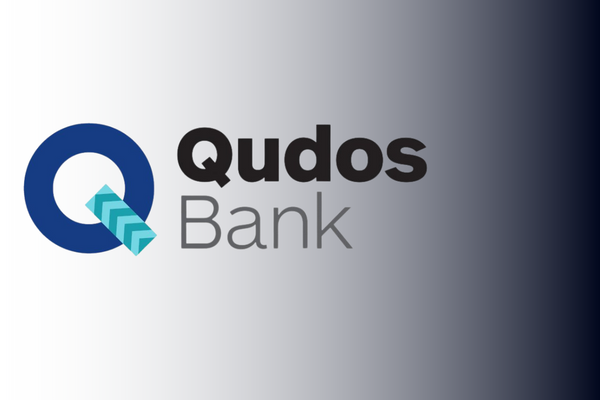
Qudos Bank selects Indue as their principal payments partner
We are delighted to confirm that Qudos Bank has reappointed Indue as their exclusive full-service payments partner.
Qudos Bank is one of Australia’s largest customer-owned banks with branches in Sydney, Melbourne and Brisbane and more than $5 billion in assets, offering a full range of financial products and services, including home loans, personal loans, transaction, and savings accounts, super and investing, and insurance.
Over recent years Qudos Bank has been on a digital transformation journey and provides a host of exceptional digital banking platforms and payments services. Qudos Bank CEO Michael Anastasi said the relationship renewal reaffirmed the strength and value of the long-term partnership with Indue to provide end-to-end payment services.
“We have a long term partnership with Indue and renewing the relationship supports continuing development in our innovation around digital banking offering and providing a state-of-the-art payment services experience for our customers, underpinned by market leading security in payments for our customers” Mr Anastasi said.
“Importantly, Indue’s customer-focussed culture is outstanding across the organisation and directly aligns to our central focus as a customer-owned bank on delivering banking services in the interests of our customers, providing synergies that will help Qudos remain at the forefront of excellent in customer service standards for our customers across Australia.”
Indue CEO Derek Weatherley said the renewal of the partnership will enable Qudos Bank to provide to their customers a comprehensive suite of end-to-end payment services coupled with market leading payment security. Qudos has been remarkably successful through a laser focus on customer advocacy and being easy to do business with – the partnership with Indue ensures that excellence in customer outcomes remains at the forefront of their business operations.
“Indue remains heavily invested in advancements in our product technology capability, reinvesting our profits into research and development via our Innovation Hub and the various working groups it supports and continuing to support the digital transition of our clients,” Mr Weatherley said.
“We couldn’t be more pleased Qudos Bank has chosen to extend our long-term partnership and we are looking forward to working together to build out future innovation pathways for real time, data rich, frictionless payment choices for customers. Qudos has been a great supporter of their community and we look forward to working closely with Qudos this year on supporting and driving community focused outcomes important to their organisation.
“The payment products and services suite provided to Qudos Bank by Indue will include NPP, PayID & Pay To, mobile payments, Orion Financial Crimes, Cards, Direct Entry, and BPAY services.”
-ENDS-

NPP Roadmap provides update on the platform’s uptake and capability development
The NPP October 2022 Roadmap has been published.
An update on the NPP roadmap is now available providing the latest numbers relating to the growing use of the NPP. There are now close to 89 million accounts able to make or receive NPP payments and the platform now processes more than 100 million transactions a month. One in three of all account-to-account credit transfers are occurring via the NPP. There are close to 13 million registered PayIDs, a 44 per cent increase since the same time last year with 315,000 new PayID registrations on average being added every month. Usage of PayID is growing with research conducted by NPP Australia revealing that 47% of users using PayID at least weekly.
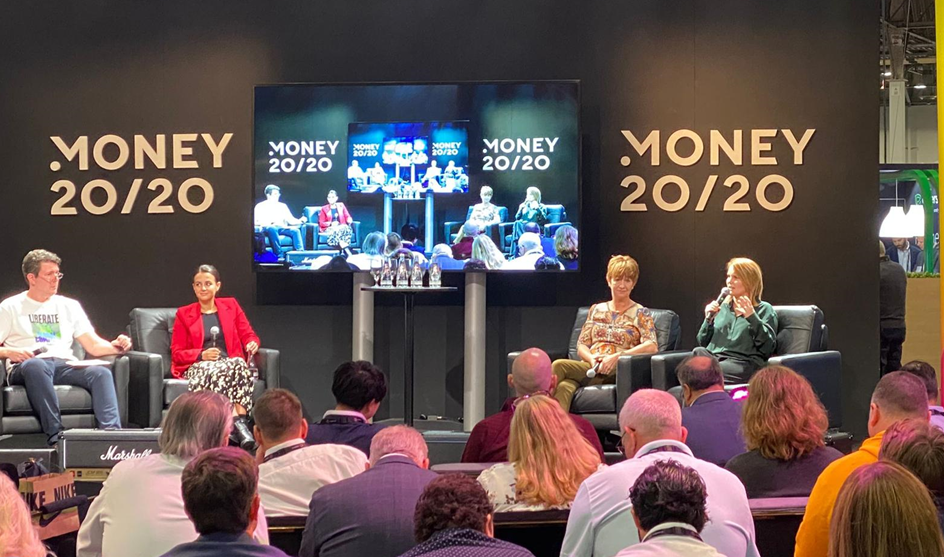
ID8 Tour | Money 20/20 – Blockchain & Crypto
Blockchain and
crypto have made a surprising resurgence to the agenda at Money 20/20, likely
driven by the growth in central bank currency pilots and collaborations into potential
use cases for government issued digital currency. The Indue client tour
participants absorbed broad learnings on how the concept of a fully digital
decentralised network could benefit customers and clients in the payments and
banking sectors.
A wide spread of
blockchain use cases were presented, everything from connected cars through to
micro payments, with the major feature being the ability to move money in
real-time at lower cost, a presumption that we see either prove or disprove
itself in the years to come.
The focus on the
use of crypto in payments has been heavily on enabling cross-border
transactions, as well as the challenges posed by increasing regulation.
The bold headline
from proponents of the technology at Money 20/20 was that everything will be on
blockchain – it’s only a matter of time.
This optimism
comes with words of warning. These technologies continue to be developed
through a cycle of uncertainty and regulation remains a major challenge. With
improved regulation we will likely see a more stable and genuine value emerge
for crypto and the development of more businesses with underlying strength.
With these
expansive developments in the fintech space, Indue continues to stay tuned to
these innovations to provide our clients and their customers with strategic
guidance and forethought on the payments landscape of the future.

id8 Tour | Money 20/20 Diversity & Culture
The Money20/20 conference has given us the opportunity to hear from a wide range of world-class speakers, including global entrepreneurs and even a Grand Slam tennis champion, who have all touched on the intrinsic link between organisational culture, diversity, and performance.
The companies that are best positioned to establish a competitive edge are the ones that embrace a culture of prioritising diversity of people and thought, and equally, this diversity is the best form of due diligence when developing new business models or entering new markets.
In a broad ranging discussion about fintech and start-ups featuring Serena Williams, we heard about new business models and solutions that are focused on solving problems for customers, leveraging the power of partnerships, and driving a competitive edge through organisational culture embracing diversity.
We were also fortunate to hear from several women who have founded new payment fintech companies in the past two years, including Kontempo – a Mexico-based bank focused on providing credit to small businesses, Lucy – which is providing funding for female entrepreneurs, and the competitive edge through embracing diversity was a recurring theme.
The theme of modernising core was prevalent, ensuring foundations are built on future proofed architecture. Another common theme in this vein was ‘build core, partner everything else’. This includes leveraging partnerships for insightful and innovative product design, and the theme of diversity featured again through partnerships that support organisational diversity, with a US Bank focussing a commitment to diversity though partnering with fintechs who are focused on minority/women only businesses.

Indue Delivers Rapid NPP Implementation For Auswide Bank
Auswide Bank customers can now send and receive payments with other financial institutions in near real-time, following the successful launch of a New Payments Platform (NPP) offering by Indue.
Indue Chief Customer Officer Fred Perry said the implementation of NPP for Auswide Bank was remarkable due to its rapid speed to market and seamless delivery.
“Since Indue’s appointment as Auswide Bank’s exclusive full-service payments partner earlier in 2022, we have worked tirelessly to expedite this NPP implementation in addition to our DE and BPAY services,” Mr Perry said.
“As a result, the platform was launched in less than three months.
“The real key to completing the full NPP implementation so quickly, while ensuring the platform integrated seamlessly into Auswide’s current banking offering, was the strong collaboration between the Indue and Auswide Bank teams.
“The launch of NPP for Auswide demonstrates Indue’s ability to deliver integrated solutions efficiently and seamlessly to our customers, with industry-leading knowledge of the technical
and regulatory requirements needed to successfully complete a full NPP implementation.”
Auswide Bank Chief Customer Officer, Damian Hearne, said the implementation of the NPP for customers has been highly anticipated and will be a game-changer for every-day banking needs.
“The New Payments Platform really brings banking in-line with the way people operate on a day-to-day basis. Our expectations for sending and receiving information are aligned to the internet and the digital applications we use each day. The NPP will allow our customers to perform their banking requirements faster, smarter and more securely without the stress of when funds will arrive.”
Indue remains committed to supporting our customers through their digital transformations and providing state-of-the-art customer experiences and business outcomes.

Real-Time Payments Are Reshaping Economies – New Report
Australia’s New Payments Platform (NPP), now available to more than 75 million account holders, has experienced steady growth since its 2018 launch.
But with NPP now expanding its use cases with the launch of new overlay services, such as the PayTo service, real-time volume is expected to gradually increase, recording a CAGR of 19.9% from 2021-2026.
How can banks and financial institutions throughout Australia prepare for and benefit from this growth?
Have a look at the new 2022 Prime Time for Real-Time global payments report for a comprehensive look at Australia’s real-time landscape.
The ACI Worldwide report shares 53 global real-time markets to show the trends, technologies and initiatives driving real-time success around the world.
The report includes:
- Economic impact analysis for 30 countries
- The increasing necessity of cloud and payment hubs
- Regional and local fraud management essentials
Source: ACI Worldwide 2022
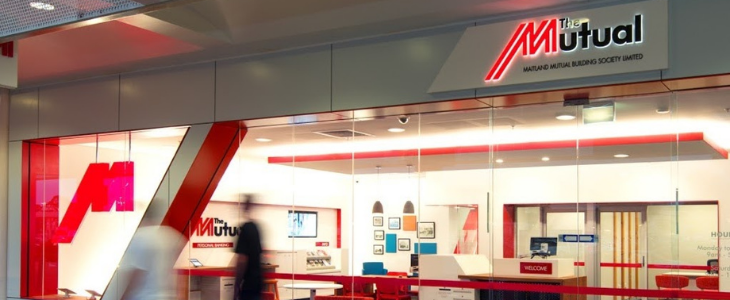
The Mutual Bank appoints Indue as their principal payment partner
Today we are delighted to confirm that The Mutual Bank has chosen Indue as their principal payments partner.
The Mutual Bank, a $1 billion mutual bank based in the Hunter region of NSW, has been serving the people of the Hunter since 1888. It offers a full range of financial products and services, including home loans, transaction and savings accounts, digital banking and payments services, credit cards, business banking and insurance.
The partnership will provide The Mutual Bank and its members with access to Indue’s comprehensive suite of end-to-end payment services delivered through Indue’s ongoing digital transformation program, which has focused on major investments key to the mutual sector.
The Mutual Bank CEO Geoff Seccombe said ‘the relationship formed today strengthens an already proven partnership that started with a digital payment solution and is now moving to end to end payment services’.
Indue CEO Derek Weatherley said ‘The strategic partnership with The Mutual Bank reflects the relevance of our ‘member first’ ethos as well as the strength of our product roadmap for the mutual industry, which has been delivered through a $50m program focussed on the future of customer experience in payments. Indue’s evolving suite of digital payments bring real time, data rich, frictionless payments to mutual members anywhere, anytime, with the peace of mind brought by our market leading real time fraud and AML capabilities’.
Indue CEO Derek Weatherley said the seven-year strategic partnership was a pleasing evolution of a relationship that formed when Indue worked with The Mutual Bank to assist them to be the first locally based issuer of Apple Pay in their region.
“Indue already provides Mobile Payments services to The Mutual Bank, and as part of that existing relationship we developed a trusted partnership based on mutual respect. It became clear as we worked together that there was tight alignment between our values, our product offering, and their payments needs. It became evident that Indue was an ideal partner to support The Mutual Bank in their mission to serve the Hunter community.
“The payment services suite provided to The Mutual Bank by Indue will now be significantly expanded to include Direct Entry, BPAY, NPP, Financial Crimes, Anti-money laundering, Card Services, High Value Payments, PEXA and an expansion of their Digital Payments offering, which will create efficiencies and deliver resilient and secure payments to their members.”
Mr Weatherley said the teams were very much looking forward to working together through a speedy transition and to build on our successful partnership to date with The Mutual Bank. Our servicing model takes the pressure off The Mutual Bank to take the lead on payments as we do this for them, giving them the space to focus on what matters to them, which is serving their community.
“We see significant cultural alignment with both organisations being ‘member first’ – focused on serving their customers and communities – and we couldn’t be more pleased to be partnering with The Mutual Bank to help them continue to deliver outstanding service to the community of the Hunter.”
The Mutual Bank CEO Geoff Seccombe ‘Indue earnt our trust and respect by delivering on their promise and their customer first focus was directly aligned to our focus on our members and community’.
See press release
ENDS
For more information please contact:
Clare Mitchell – Head of Marketing & Communications
[email protected]

Top Five Banking Predictions for 2022
Top Five Banking Predictions for 2022
Keen to keep pace with the impact of recent global events and an accelerated digital shift, how are financial institutions, consumers and SMEs adapting their behaviours in coming months? RFI Global’s infographic explores our top predictions for 2022.






NPP Roadmap Released (New Payments Platform)
New Payments Platform (NPP): October 2020 Roadmap Released
The October 2020 New Payments Platform (NPP) Roadmap has been published by NPPA, outlining plans to enhance and extend the NPP’s capability
The October 2020 NPP Roadmap includes an update on the enablement of international payments via the platform as well as case studies from organisations leveraging the New Payments Platform’s capabilities to deliver innovative payments experiences and improved business efficiencies.
You can download the NPP Roadmap here.
www.nppa.com.au
www.payid.com.au
Source: NPP Australia

5 Trends influencing payments by CEO Derek Weatherley
The top five payment trends influencing 2020
The digitisation of payments, changes in ecommerce and acceleration of mobile wallet adoption are global payments trends in 2020 challenging the industry to keep pace. These trends are not only forcing businesses to change the way they operate, but are also putting data security at the forefront of business strategy.
With the future of payments quickly coming into focus — thanks in no small part to the impact of COVID-19 — Indue CEO Derek Weatherley shares his insights on the top five payment trends influencing 2020.
- The ecommerce experience and embracing the evolution
Even prior to the COVID-19 pandemic, ecommerce was expected to continue to grow rapidly in 2020. But restrictions and public space shutdowns have significantly changed consumer behaviour, with a 29 per cent increase in ecommerce spending locally month-on-month since lockdowns began in March1. On the other hand, physical transactions have decreased and people are using less cash — a longer-term trend accelerated by the global pandemic as some businesses discourage the use of cash.
Helping drive this trend is a population seeking more flexible and convenient ways to pay. Combine this with confidence in stronger digital security and a willingness within the retail sector to embrace technological change, Australia is starting to see mobile payments take off. In 2019, The Reserve Bank of Australia reported 83 per cent of point-of-sale card transactions were contactless payments, signifying a rise of almost 20 per cent in three years2. COVID-19 is only adding to this rise with the payments industry temporarily increasing the contactless card PIN limit from $100 to $200 to minimise physical contact with the payment terminal and help reduce the risk of COVID-19 transmission.
One trend to keep a close eye on is the digital wallet. Roy Morgan’s latest Digital Payments Report revealed that digital wallets such as Apple Pay, Google Pay and Samsung Pay are being used by roughly one in 10 Australians (9.8 per cent) — up from 6.8 per cent a year ago3. This upward trend will continue, but the mobile wallet race hasn’t fully played out just yet as the industry looks to cater for all the different use cases.
One thing is clear — the payment industry will continue to evolve to meet the needs of merchants as consumers demand improvements to the overall ecommerce and contactless experience.
- Congestion, Competition and the Customer Dollar
It’s a busy time for payment systems operators, with heightened conversation taking place across payment schemes in the industry. We’ve also seen in recent times a significant transformation of the base-level clearing and settlement capabilities, causing disruption for many in this space and providing future innovative payment solutions.
The high level and pace of change is causing congestion and headaches for financial institutions and payment providers. As older forms of payment are migrated, schemes are coming into competition with each other, creating congestion and ultimately higher costs for consumers.
This will likely settle in the next three to five years as the industry settles on its future scale approaches to utility payment processing, but the medium-term landscape remains challenging and costly.
Understanding what’s next in payment industry platforms comes down to understanding the value proposition in the eyes of consumers and merchants and their respective appetite to pay. We expect to see competition between providers of closed and open payment platforms increase, as they contest for a larger slice of their customer dollars and loyalty4.
- Money moves fast and attacks are evolving
Data security in the world of payments has never been more crucial and with innovation comes security issues as payment products and services evolve. The speed of transactions have increased through advancements like New Payments Platform (NPP) real-time payments, and we are exposed to significantly larger and more valuable data footprints online, which all contribute to a heightened risk of fraud. By investing in sophisticated machine learning payment technology, Indue now has the capacity to draw from a much larger pool of data and undertake significantly more sophisticated real time analysis to detect trends that benefit — and protect — each individual client.
Indue’s Orion Financial Crimes solution integrates human and artificial intelligence (AI) with machine learning algorithms to deliver a 24/7 fraud monitoring solution. This solution provides a broad gambit of services, including real-time fraud and anti-money laundering monitoring across all payment channels. This is a significant shift in how financial institutions trade on trust, and therefore need to put reputation and security at the forefront of their business priorities. Without robust data security measures, businesses run the risk of damaging their brand and making consumers feel uncertain about the safety and security of their accounts.
We have transformed our financial crimes services and continue to invest in leading-edge payment technology to better monitor trends and ultimately protect our customers from fraud. Assurance of identity in a virtual world is another key area of focus in an increasingly digitised world and an area where we are assisting our customers to adapt to with ongoing innovation in this area.
- Less friction, more function
Product commoditisation will not only challenge business models, but shift the economic climate, especially in the banking and fintech sector. Digitisation and ease of payments have changed the way customers think, decreasing the value of traditional competitive differentiators in the process — payments are now instantaneous, simple and 24/7.
As consumers become more and more accustomed to these seamless transactions, it presents a challenge to providers who need to balance the cost of creating a frictionless experience and meeting consumer expectations. Expect to see structural shifts among the players operating in this environment as they look to drive revenue through new or enhanced customer experiences, and make use of data analytics to anticipate customers’ changing needs and expectations4.
- Wake up to new ways
COVID-19 has made embracing and adapting to the work-from-home environment a must for businesses. The shift has provided opportunities for businesses to expand their workforce and recruit talent from anywhere, as most payment organisations aren’t restricted by location.
Even before COVID-19, Indue embraced work from home and flexible working hours, revising the way we manage talent to reap the positive benefits of a geographically dispersed workforce and provide an increased work/life balance across the organisation.
The final word — what do these 2020 payments trends mean for our customers?
Our customers rightly focus their investment dollars on driving the top line, and leave the distraction of digitisation and changing payment rails to us to handle on their behalf. However, with continued evolution of the online world, it’s important that our customers sensibly invest in the modernisation of their platforms, particularly those platforms that make their customers lives easy. They don’t need to be on the leading edge, but do need to keep pace.
References
1 https://www.adnews.com.au/news/online-shopping-orders-have-increased-49-this-year
2 https://www.mobiletransaction.org/au/tap-and-go-trending-in-australia/
3 http://www.roymorgan.com/findings/8308-digital-payment-solutions-december-2019-202003100329

NPPA Update: Five million PayIDs registered in Australia
Five million PayIDs registered in Australia
NPPA – Five million PayIDs have now been registered by Australian consumers and businesses looking for a simple and cashless way to receive instant payments straight into their bank account.
The PayID service, which is available in the internet or mobile banking of nearly 90 Australian banks, credit unions and building societies, was launched when the New Payments Platform went live in February 2018.
PayID enables registered users to receive instant payments into a bank account via a simple identifier, like a phone number, email address, ABN or business name, instead of a BSB and account number.
It replicates the speed and ease of cash, while also providing additional assurance through a payee confirmation step – the ability to see the name of the person or business associated with a PayID prior to a payment being made. This confirmation step reduces payments being mistakenly made to the wrong person or business.
Since its launch, people have turned to PayID as a simple and cashless way to pay family and friends, from splitting bills to sending money to family members during emergencies.
“Research suggests to us that the uptake of PayID has been largely driven by word–of–mouth and the experience of paying another person’s PayID,” said CEO of NPP Australia, Adrian Lovney.
PayIDs Registered for a Quick Cash Payment
“When a user asks another person to pay their PayID, it’s often in situations where they require a quick cashless payment, or they don’t want the hassle of remembering and sharing a BSB and account number.
“When the payer experiences the speed and ease of paying another person’s PayID inside their usual internet or mobile banking app, they’re more likely to register their own PayID with their financial institution. It’s almost like a ‘paying it forward’ situation,” he said.
Businesses have also turned to PayID as a cost–effective alternative to cash or cards, particularly during the COVID-19 pandemic. Since March, more businesses have advertised PayID as a payment alternative, particularly those who rely on cash on demand such as cafes, hairdressers or services such as mobile dog washing.
Use by Payment Innovators
Payment innovators are also using the NPP’s PayID capabilities to enable real-time and contactless point of sale payments. Azupay, which has been developed by an Australian fintech, works by creating a unique, single-use Azupay PayID at the time of payment, which automatically includes the merchant information required for reconciliation such as the amount and a description. Customers then use that PayID, either by entering it manually or via a QR code, to make the payment without the need to input additional information.
The NSW Government’s Department of Customer Service recently began offering Azupay payments for Liquor and Gaming licence renewals with further rollout plans currently underway.
Source
This article originally appeared on nppa.com.au (NPP Australia)
Indue is one of the 13 founding members of the NPP initiative, which facilitates real-time settlements of payments with funds available in your account in less than a minute.
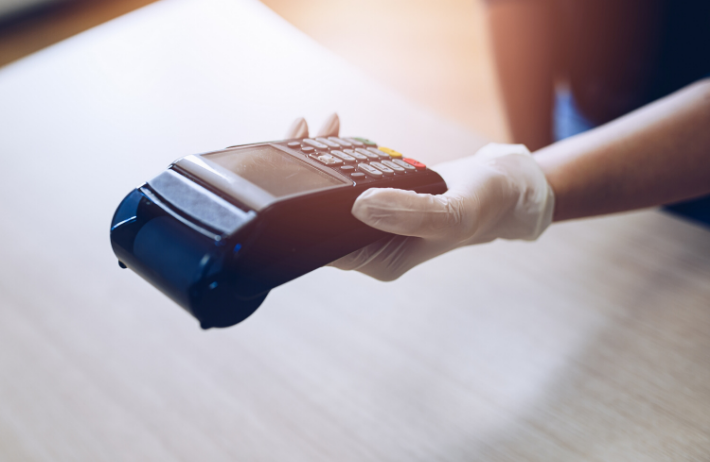
2020 Pandemic: How might it change the ways we pay?
2020 Pandemic: How might it change the ways we pay?
Although the total number of payments in the Australian market is currently suffering a severe decline, as economic activity is strongly curtailed, what might happen to the ways consumers pay after the 2020 pandemic? Guest writers, David Oierholm and Lance Blockley of The Initiatives Group, offer their view.
The COVID-19 2020 Pandemic is having an unprecedented impact on how we live and work. We are planning for the worst and hoping for something better. No matter how long it takes for the crisis to pass, 2020 will be a year that is not forgotten quickly.
It will undoubtedly be a period of change, some of which will alter the way we do things forever.
We are likely to wash our hands more frequently, and we will be much better at conducting remote meetings using platforms such as Zoom, Webex, Skype for Business, GoToMeetings, etc. Telemedicine will likely become more prevalent, as will the ability and propensity to work from home effectively.
We will be super-sensitised to microbes, and, given the economic impacts being experienced, we may be more concerned about the sustainability of the companies we buy things from, together perhaps with more conservative views regarding our ongoing employment and income. Indeed, the cross-border supply chains that have been constructed over the last 15+ years of globalisation have been shown to be a potential weakness (e.g. a key global production site of surgical masks being in Wuhan), so perhaps domestic manufacturing will get a boost everywhere and cross-border commercial transactions decline.
Although the total number of payments in the Australian market is currently suffering a severe decline, as economic activity is strongly curtailed, what might happen to the ways consumers pay? Not necessarily in the short term – although many merchants are now refusing to take cash, travel card issuance & usage has crashed, and cross-border payments (a key revenue source for the international schemes) are drying up. Rather, we are looking at the potential longer term residual impacts.
In The Initiatives Group white paper “The Changing Face of Consumer payments in Australia”, we identified that the way we pay takes a long time to change. It is all about trends, and long ones at that. The following graph was used to show how the ways we pay have changed over the past 15 years. The trends are clear – cash and cheques are on the decline, and fast becoming in the minority of transactions. Electronic payments continue to increase. Cards are now more than 60% of transactions, with the growth in debit cards far outstripping credit cards. It is now quite normal to pay for a morning coffee (currently only available as “take away”) using a card – not so long ago a $3.50 purchase would have been made with cash.
The trends are clear – cash and cheques are on the decline, and fast becoming in the minority of transactions. Electronic payments continue to increase. Cards are now more than 60% of transactions, with the growth in debit cards far outstripping credit cards. It is now quite normal to pay for a morning coffee (currently only available as “take away”) using a card – not so long ago a $3.50 purchase would have been made with cash.
What might happen to cash?
“Fed Plans Release of Clean Cash As Virus Spreads” (pymnts.com, March 22, 2020)
The decline in the use of cash will accelerate, along with an associated decline in ATM usage (noting that for every ATM withdrawal that does not happen, an additional 10-15 electronic transactions will be generated, mainly on debit cards).
 Cash carries bacteria 1 (no prior studies seem to have focused on viruses!). Both cash and bacteria travel fast. Even though it has been found that polymer notes, like those used in Australia, carry less bacteria than (absorptive) paper notes such as those in the USA and China, consumers and merchants alike will be less keen on handling cash, and more keen on using electronic payments. Indeed, the UK has just lifted the contactless limit from GBP30 to GBP45 to help further reduce the use of cash. More locally in Australia, one of your authors has found that cash is no longer accepted at the local Coles Supermarket, Harris Farm Markets and the golf club (which is closed for now anyway).
Cash carries bacteria 1 (no prior studies seem to have focused on viruses!). Both cash and bacteria travel fast. Even though it has been found that polymer notes, like those used in Australia, carry less bacteria than (absorptive) paper notes such as those in the USA and China, consumers and merchants alike will be less keen on handling cash, and more keen on using electronic payments. Indeed, the UK has just lifted the contactless limit from GBP30 to GBP45 to help further reduce the use of cash. More locally in Australia, one of your authors has found that cash is no longer accepted at the local Coles Supermarket, Harris Farm Markets and the golf club (which is closed for now anyway).
So, are plastic cards the answer?
Australians are the world leaders in the use of contactless open-loop payments, with well in excess of 90% of card present transactions being contactless. This means that, for transactions under $100, we don’t need to touch a terminal that somebody else has used or handed us. We also don’t have to hand our card over to a stranger. That’s good, right?
Well, maybe not… unfortunately there are studies, albeit in the USA, where contactless payments are still in their infancy, that have shown that cards “can be grimier than cold hard cash”.2
However, it still feels safer to use a card that only you have held than notes and coins that have gone through multiple hands, so plastic cards will quickly pick up transactions from cash.
How about other transactions that use the card rails?
Mobile Wallets
Despite the high ownership of smartphones and Australians’ love of contactless payments, until recently, the take up of mobile wallets such as Apple Pay, Google Pay and Samsung Pay (the “Pays”) has been slow. It may depend on your industry and your demographic, but The Initiatives Group has heard conflicting reports. Claims of 25% of POS transactions being handled via the Pays have been offset by merchant claims of far far lower percentages, hence we would suggest that the average across all contactless payments is still under 10%.
Regardless, the use is set to accelerate. Your phone may or may not be a great carrier of bacteria, but it is something you will touch anyway, so what’s the difference if you now use it for payments and avoid fiddling around with your wallet for a card.
Wearables
Whilst wearables are only another form factor for using the Pays, their use is likely to increase as an even more “contactless contactless” form of payment. Notwithstanding we believe that wearables, perhaps other than smart watches, will remain relatively niche.
In-app payments
In-app payments are likely to be a big winner from the COVID-19 crisis. Seamless payments will be the most contactless of contactless payments. Whilst in the short-term popular use cases such as Uber transport will take a significant hit, there will be many new use cases that become available earlier or even more popular – think of ordering home delivery (from supermarkets, for prepared food e.g. Menulog, Ubereats) and petrol stations (where something like the Caltex app avoids the need to enter the shopfront). We will be more ready to form new “safe” habits, and, if used frequently enough, these use cases will be habit forming, just as the adoption of contactless card payments was slow until Woolworths and Coles offered them (back in 2012).
We found the new 13cabs “No Touch Parcel Deliveries” of interest. Whilst no-touch may not be as big a deal from 2021, here is another reason to get into the habit of using in-app payments for taxi services. In the future will we see the groceries delivered paid within the 13cabs app, or the taxi delivery paid for within the Coles or Woolworths app?
Peer to peer payments
As handling cash becomes less popular, might we now see electronic peer to peer payments use accelerate. Perhaps this will provide stimulus to the use of PayID, Beem It and card-tocard systems. Although current social distancing and work-fromhome orders may well diminish the need to pay our friends and relations in the near term.
eCommerce card not present
In the short-term, eCommerce spend on travel and discretionary items has tanked, however online ordering of grocery goods and fresh foods is up globally. Discretionary spend, such as fashion, will recover once people are again allowed to physically interact. Grocery and fresh food ordering online will be a new habit – whether for home, work or locker delivery, or click and collect. Although it may not maintain at COVID-19 levels, this will likely fuel more rapid long term growth in eCommerce retail spend.
Monthly payments
The economic impact of potential (or actual) unemployment, of recession and of media noise about depression, will all make consumers more wary of both the sustainability of companies that they deal with and their own ability to pay in annual large lump sums. We predict this will lead to a preference for annual payments to be made monthly (already a trend before the crisis), and not necessarily by auto direct debit (as consumers may wish to retain control). In addition, this preference may lead to consumers demanding that they are not penalised with any surcharge for paying monthly.
Noting that, just as the decline in ATM use accelerates the volume of electronic payments, so too does monthly payment . . . 12 transactions rather than one.
New products
Adversity is often the mother of invention, so it is likely that we will see a range of new electronic payment products, use cases and services being created.
Opportunities only for the card rails?
An emphatic “No”. As noted above, online real-time payments over the NPP may be accelerated – whether by Osko, other overlay services or by ‘pay anyone’ (previously via direct entry) payments growing faster. The increased volumes allowing the NPP to become less expensive per transaction.
Perhaps a trend towards mobile phone payments will improve the use case for NPP payments on your phone at POS, enabled by QR codes? Notwithstanding, we do expect that there will be even more new overlay service activity that takes advantage of the NPP.
Conclusion – How might Covid 2020 Pandemic Change the Way We Pay?
The current COVID-19 crisis will see payment volumes drop sharply as economic activity stalls. Within the remaining payment activity, the mix of payments will change:
- The reduction in cash and ATM usage that has been occurring over many years will accelerate into a steep decline
- The cross-border usage of payment cards will drop to low levels
- Use of contactless card and mobile payments will rise
- Use of remote services/ordering, and with them the associated remote payments (eCommerce, in-app, other online), will increase
- A move to monthly payments.
Depending upon the length of the crisis, many of these changes will become habitual and are likely to outlast the short term impact of the virus – such that the retail payments mix in the Australian economy will be altered forevermore.
Disclaimer: The opinions expressed in this article are the author’s own and do not necessarily reflect the view of Indue. The Initiatives Group has advised participants in the payments market since the 1990’s – including issuers, acquirers, third-party processors, technology providers and associations. The Initiatives Group has a strong relationship with Indue, and can help participants in the payments sector generate more value from their markets and customers. To find out how, please get in touch.
Sources:
1 A Oxford University study in 2014 found that the average European banknote contained 26,000 bacteria which could be potentially harmful to a person’s health; and market research has found the majority of European consumers rank physical money as being more unhygienic than the hand rails on public transport
2 https://www.fastcompany.com/90480199/how-companies-can-support-their-employee-caregivers-duringthecovid-19-outbreak

Insight: The changing face of consumer payments in Australia
Insight: The changing face of consumer payments in Australia
Our guest writer, David Oierholm, Director of The Initiatives Group, sheds light on the changes and trends of consumer payments in Australia.
The ways in which consumer payments in Australia are made is often likened to a train system comprised of the “rails” that carry the carriages (the payment systems), and the “carriages” that carry the passengers (the individual payments).
The media will have us believe that the payments landscape in Australia is constantly and rapidly changing. To an extent this is correct – but this is all about new “carriages” rather than “rails”.
Furthermore, simply because there are new ways to pay on offer, it does not mean that we all immediately change the way we pay. For example, it took well over 5 years for both BPAY and (much later) contactless card payments to become mainstream.
In Australia, there has only been one new set of rails introduced in the past 25 years (The New Payments Platform (NPP), 2018)
The Way We Pay
It is about trends, and long-term ones at that. The following graph shows how the ways we pay (our use of the rails) have changed over the past 16 years, exhibiting slow movements and not, as many media commentators would suggest, overnight leaps.

The trends are clear – cash (as proxied by ATM withdrawals) and cheque usage are on the decline, and fast becoming the minority of transactions. Electronic payments continue to increase. Cards now account for more than 50% of all payment transactions, with the growth in debit card activity far outstripping credit card since 2007. It is now quite normal to pay for a morning coffee using a card – not so long ago a $3.50 purchase would have been made with cash.
Will cash and cheques ever completely disappear? It is more likely that cheques will disappear, but only when the industry and/or regulator set a termination date – otherwise someone, somewhere will keep using them. However, the ability to access and use cash is considered critical for members of society who may be unbanked, and for remote residents where electronic payments may either be unavailable or inconsistent. Even in those economies closest to being cashless, such as Sweden, there are government requirements for the economy not to become cashless – at least not until no one is left behind or disenfranchised.
In 2019, the San Francisco Board of Supervisors passed a law requiring that all bricks and mortar retail businesses must accept cash – this even includes the Amazon Go stores (more about them later). This move is to make sure that the city’s poorest residents are not shut out of access to basic goods and services. Whereas “cash not accepted” signs are common in shops in Sweden.
The Rails
The rails for electronic payments in Australia include the card rails (Visa, Mastercard, Amex, eftpos), the rails for direct entry and direct debit payments known as BECS (Bulk Electronic Payment System), the real-time payments rails operated by New Payment Platform Australia (NPP) and the international bank to bank transfer rails (SWIFT). The only one of these sets of rails that has been introduced within the last 25 years is the NPP, launched last year.
(Source: The Initiatives Group)
The Carriages
What runs on the rails is where the new action has been, as a plethora of “veneers” have been placed on top of the payment rails, giving the perception that the movement of money has changed. What has changed, and greatly, is the consumer interface, which has become more convenient, simple to use, frictionless and seamless. But, as noted earlier, just because a new way to pay is being offered there is no guarantee that it will be used.
Mobile Wallets (Mobile Payments)
Mobile wallets such as Apple Pay, Google Pay and Samsung Pay, otherwise known as “The Pays”, have arguably received more media headlines than any other payments related topic over the past few years. Despite this, it is estimated that they represent fewer than 5% of card present transactions, albeit that there now seems to be some acceleration in the adoption rate.
Requiring a credit or debit card to fund a transaction, The Pays operate on the Visa, Mastercard, American Express and, to a lesser extent, the eftpos rails. They have been offered in Australia since 2015 when Apple Pay was launched with Amex.
Even though some would describe it as simply a new “form factor” – a contactless payment (now over 90% of card present transactions) using a phone rather than a plastic card – the rollout through the payments industry has been slow. A popular hypothesis is that using your phone currently offers little benefit over using a plastic card – that is, there is no value added.
In addition, there has been significant reticence amongst the major banks to fund the fees payable to Apple Pay, which also comes with the limitation of no other application being able to access the NFC interface on the iPhone. However, as of today the only major Australian bank that does not offer Apple Pay (considered the vanguard of The Pays) is Westpac, so it is felt that the current low usage rates will increase to more significant levels over the next few years, assisted by use on mass transit.
A different type of mobile wallet where you can “pre-fund” your account prior to purchase (or link to a “top up” source of funds) is particularly popular in China, and increasingly so throughout Asia. AliPay and WeChat Pay both from China are prime examples.
When making purchases, these systems run on their own sets of rails with the transaction driven by a QR code interface (overcoming Apple’s NFC quarantine). This has permitted significant growth in electronic payment acceptance due to the simple and low cost set up for the payee. However, to fund the account, money is transferred from the user’s card or bank account.
This means the funding uses existing payment rails. To date the use of QR codes in payments in Australia has primarily been limited to visiting Chinese tourists. Australians are already well served by NFC contactless payments, so, whilst there may be more value-adding capability within a QR code, there is little incentive for consumers to change.
Another popular wallet, although not so much in mobile format (at least not in Australia), is PayPal. Created as a payment wallet to make secure online transactions, the PayPal wallet can be instantly funded by a credit or debit account, or pre-funded. An interesting contrast is that in the US keeping funds in a PayPal wallet is popular, whereas in Australia it is not.
In-app Payments or “payments in the background”
Popularised by the success of the Uber rideshare app and the “just get out of the car at your destination and walk away” payment experience, in-app payments are the topic of a separate whitepaper published by The Initiatives Group.
Sometimes criticised for making it too easy for consumers to overspend as they do not have a “transaction moment” to reconsider their purchase, in-app payments are growing even faster than e-commerce. Prime examples include Uber – familiar to most of us; Grab, which dominates carshare in South East Asia, and which is now promoting its payment service in its own right as “GrabPay”; and the Hey You (Beat the Q) café pre-order and payment aggregator app.
In the USA, Starbucks is prolific enough to have its own pre-order and payment app, which accounts for a significant proportion of their sales and is integrated with the Starbucks Loyalty program. Further loyalty integrations are underway. For example, in the USA you can use American Express Membership Rewards points to pay for your Uber ride. Amazon is taking the in-app, seamless shopping and payment experience to the nth degree, (possibly out of the budgetary capabilities of most retailers) with its Amazon Go “no lines, no checkout” concept stores, it is extreme but an insight into what is already possible!
In Australia, Woolworths is currently trialling “Scan & Go” with selected Woolworths Rewards loyalty members in Sydney – it is a variation on Amazon Go, where shoppers scan items when they take them from the shelf and then just tap off when leaving the store. This is important, as Woolworths and Coles are able to move the market: it was really not until they adopted the NFC technology that contactless payments became commonplace in Australia.
The Form Factor
Many innovations on the existing payment rails are actually changes in the form factor. As noted earlier, mobile payments are, for the most part today, simply the ability to use your phone to make a contactless card payment, rather than use the physical card itself.
Other new form factors include smart watches, including the Apple watch, Samsung Gear watches, as well as Garmin and Fitbit with Garmin Pay and Fitbit Pay respectively. Similarly, there are wrist bands and tabs attached to watch bands, even sunglasses and jewellery, such as the Bankwest Halo Payment rings. Current opinion is that these “wearables” will become popular, but amongst niche groups rather than the general population – for example waterproof bands and rings for swimmers, surfers, runners and cyclists.
BPAY and Pay Anyone
BPAY and Pay Anyone (Direct Credit on internet banking or a banking app) are payment methods that use the BECS Direct Entry system. Both allow for bank account to bank account transfers five days a week (excluding Public Holidays), with banks transferring funds 5 times per day (but not necessarily posting them to accounts that frequently).
Reliable, secure and low cost, however it is possible that a transfer can take some time to occur or appear in the receiving account – if the transfer is made late on Friday afternoon and is to a bank that is not posting intra-day settlements it may not be until the following Tuesday that the funds appear in the recipient’s account.
Whilst BPAY volume continues to grow, BPAY now somewhat competes with itself as the provider of the first “overlay” service “Osko” for the NPP, which allows real time payments between consumers and businesses via BSB and account number or with a registered PayID (mobile number, email address or ABN) linked to their bank account. Further, a number of Financial Institutions have and are moving their Pay Anyone / Direct Credit transactions onto the NPP rails, instead of using BECS.
P2P (peer-to peer) Payments
Particularly popular in geographies as diverse as the USA and China (perhaps due to the antiquated and previously limited payment systems available), P2P payments allow instant payments between consumers – splitting the bar tab, paying your share of the rent, getting money to the kids quickly, etc.
Venmo (now owned by PayPal) in the USA and WeChat Pay in China are prime examples. Both allow instant payments between other Venmo or WeChat Pay users from a pre-funded wallet. Perhaps they could be considered alternative rails, however, funding still comes from the existing rails transfer methods as these are linked to accounts.
In Australia, BeemIt allows P2P payments between BeemIt users, requiring only a Visa or Mastercard debit card for registration. Interestingly, BeemIt accesses bank accounts by using Visa and Mastercard for the authorisation messaging, then uses the eftpos rails to achieve the instant funds transfer.
As with many new ways to pay, BeemIt has not (yet) become popular in Australia as it has yet to gain sufficient penetration or ubiquity, and perhaps does not solve a significant problem that Australian consumers have (given the various other ways that they have to pay).
Real-time Payments
The establishment of real time payments platforms, moving and posting money between accounts 24×7, such as Australia’s NPP, is a major global trend. The UK has had “Faster Payments” and Singapore “FAST” for some time. More recently, Malaysia “DuitNow” and TCH (“The Clearing House”) in the USA have introduced real time payment platforms.
The NPP was launched in February 2018, the first new payment rails in Australia for 25 years (the prior launch was BECS in 1993). The NPP is an initiative that was primarily driven by the Reserve Bank of Australia, following its review of innovation in payments, and is co-owned by 13 banking organisations. It allows for real time payments between bank accounts.
 To date, it has been held back by a somewhat uncoordinated introduction through the banking system. Whilst over 2 million PayID’s have been registered, use of the Osko payment “overlay service” has been relatively limited. This is likely to change once all banks deliver the range of features available, more entities register PayID, and business applications such as “Request to Pay” and a central consent management platform are delivered (effectively allowing Direct Debit transactions to be introduced by the NPP).
To date, it has been held back by a somewhat uncoordinated introduction through the banking system. Whilst over 2 million PayID’s have been registered, use of the Osko payment “overlay service” has been relatively limited. This is likely to change once all banks deliver the range of features available, more entities register PayID, and business applications such as “Request to Pay” and a central consent management platform are delivered (effectively allowing Direct Debit transactions to be introduced by the NPP).
Even Sweden’s “Swish” success story has taken almost 7 years since its establishment in 2012 to reach a total of 1 billion transactions through the system.
Use cases range from instant P2P payments, to real time payment of employee wages, superannuation, even to the ability to safely buy/sell a used car privately on the weekend without the need for cash transfers or bank cheques.
(Image Source: Osko.com.au)
Real-time / Faster Cross Border Payments
Cross border account to account payments have primarily been the domain of Swift and its 165 member banks. Even if the origin or destination banks are not members, the 165 banks can act as “correspondent” banks to route funds into the recipient country and currency, then onto the recipient bank. It is reliable, but can be slow, opaque and relatively expensive. The Swift rails also enable currency transfer services such as Western Union.
Faced with the emerging faster cross border payment challengers, such as crypto currencies, Ripple, Visa B2B Connect, and Visa and Mastercard acquiring FX transfer platforms, Swift has been developing faster, lower cost transfer products to enhance its existing rails. Swift GPI (Global Payment Innovation) is now conducting faster cross border payment trials, and is poised for rollout network wide.
Swift, which also provides the distributed switching platform for Australia’s NPP, is also testing its involvement in integrating the different real-time payments platforms between countries.
Thought too slow and expensive (today) for domestic payments, cryptocurrencies and distributed ledger technology is of interest for the future of cross border payments, although there is a long way to go. For example, Bitcoin transactions can occur at between 10-20 transactions a second (versus Visa at up to 56,000 per second), and crypto currencies are infamous for the volatility of their value in fiat.
However, the announcement in June 2019 of the Libra Foundation, with its bundled currency backed blockchain based “stablecoin”, and the Facebook developed Calibra payment wallet (planned to be the first wallet for Libra transactions) has generated significant excitement and debate. Whether or not is succeeds (or even permitted to launch by regulators), it raises the possibilities of western “bigtech” finally entering the payments (and broader financial services) category, and the possibility of a truly global currency that transcends fiat currencies and national borders – at the same time, reaching one of the world’s broadest social network audiences.
Will Libra run on new rails? Within the Calibra wallet this is likely, but Libra ultimately still needs to be funded from some other electronic source such as a bank account or card (even if unbanked users pass cash across the counter at “agent” locations). Indeed, it has been suggested that, to reach merchants for POS transactions, it may use the Visa and Mastercard rails.
There will be many legislative hurdles to overcome, and, in developed countries such as Australia with highly developed payments systems, there remains the question of what real problems are Libra and Calibra really trying to solve (maybe remittances?).
Use cases range from instant P2P payments, to real time payment of employee wages, superannuation, even to the ability to safely buy/sell a used car privately on the weekend without the need for cash transfers or bank cheques.
Buy Now, Pay Later (BNPL)
With millions of customers in Australia, the USA and soon in the UK, “I’ll AfterPay it” is becoming a familiar expression. AfterPay, Zip Money, Humm and SplitIt have become particularly popular amongst millennials – Afterpay claims 69% of its users are 18-35 years old.
New way to pay, on new rails? No. Latitude and Flexigroup have been offering interest free payment plans for decades, and products such as Afterpay rely on debit and credit cards to make initial payments and subsequent repayments.
However, Afterpay and its cohort have tapped a rich vein of new business – millennials who are not migrating to credit cards, with a short-term low value instalment payment product, tuned initially for online purchases and delivered digitally. Merchants with a sufficient margin structure to absorb the 4-6% fee, see the additional sales as a boon in what is currently a tough retail environment. Add to this a group of BNPL businesses, those delivering similar products to small businesses, such as ProspaPay.
Conclusion – Consumer Payments in Australia
The adoption of electronic payments by consumers and businesses in Australia continues apace, pushing cheque and cash transactions (although not the amount of cash on issue) into a relatively steep decline. Consumer payments are dominated in volume by card-based transactions, but the format of these is starting to become “buried” under layers of “veneer” interfaces, many of which rely on card-on-file for their funding source.
To the consumer, these veneers look like “new ways to pay” and certainly deliver the more convenient and seamless experience that people seem to be seeking. But underneath, the funds are moving between the payer and payee accounts as they have always done.
The new rails provided by the NPP will not generate any new transactions in the market, but will take volume from existing systems. For the sake of efficiency and the economy, one hopes that the NPP will accelerate the decline in cash usage and lead to the termination of cheques. But it will also take volume from Direct Entry and card payments. Just as Swish has entered ecommerce and the point of sale market in Sweden, once the cost of NPP transactions reduces (as it should with volume growth) then one would expect it will also appear in the online and POS environments.
The increasing use of electronic payments in Australia should see the overall cost of payments as a percentage of GDP decline and the tax take through GST and income tax rise – both of which are beneficial for the country.
Disclaimer: The opinions expressed in this article are the author’s own and do not necessarily reflect the view of Indue. The Initiatives Group has advised participants in the payments market since the 1990’s – including issuers, acquirers, third-party processors, technology providers and associations. The Initiatives Group has a strong relationship with Indue, and can help participants in the payments sector generate more value from their markets and customers. To find out how, please get in touch.

NPP Roadmap Released (New Payments Platform)
New Payments Platform (NPP): Roadmap Released
Roadmap details ongoing plans to extend and enhance the NPP
Since launch of the New Payments Platform, the industry has seen a continual increase in consumer awareness and transactional volume. NPPA is now shifting focus to ensuring the platform delivers quality and new functionality. They have now released the NPP roadmap.
NPP Australia (NPPA) has today published details of its ongoing investment in the NPP, to extend and enhance the capability of the platform to meet the needs of participating financial institutions, payment providers and users within the wider payments ecosystem.
The public release of the roadmap comes less than two years since the NPP commenced enabling Australian consumers, businesses and government agencies to make real-time data rich payments between accounts at participating Australian financial institutions.
Today approximately 85 banks, credit unions, building societies and fintechs are connected to the NPP (either directly or indirectly) and more than 66 million accountholders can make and receive payments via the NPP. At the same time, more businesses and corporates are realising the benefits
of the NPP with approximately one in three transactions involving a payment to or from a business.
As at the middle of October, the NPP is processing an average of approximately 750,000 payments worth $750 million each day. Recently more than $1 billion in transactions was processed in a single day and the largest single transaction settled on the platform so far is $500 million.
Innovative use-cases that tap into the NPP’s core capabilities have also started to emerge. This includes: independent payments solutions providers such as Monoova and Assembly Payments; a service that enables employees to access their income as they earn it in real-time (Earnd); a consumer-to-business payment service that uses the NPP’s speed and PayID to deliver real-time
validation and processing for online payments (Azupay); and combining the NPP’s speed with blockchain to create equity management, compliance and share registry services (Block8).
CEO of NPP Australia, Adrian Lovney, says making the Roadmap publicly available ensures NPP momentum will continue.
“We’re focused on developing additional native capability that can support a range of use cases, which can be used by participating financial institutions and third parties to do different things. By developing native platform capability, governed by a common rules framework administered by
NPPA, it is akin to providing ‘building blocks’ that others can put together in different ways to deliver payment products and services outside the platform.
“NPPA does this by establishing different ‘business services’ that have different uses. A business service can either be used in its native form by participating financial institutions and third parties, or it can be further built upon and commercialised by an organisation wanting to develop an Overlay
Service on top,” Adrian said.
Available to be downloaded here, the Roadmap includes the development of foundational capability to enable third party payment initiation on the NPP. Central to this proposition is the account-holder’s authorisation (or consent) for payments to be initiated on their account with the creation of a digital
payment arrangement or a ‘mandate’ in advance of the payments being made.
This functionality increases the visibility and control that account holders have over these various payment arrangements, which will resolve some of the most frequent pain points with these kinds of payments today. It could enable a range of use cases in the future, such as recurring or subscription
type payments, ecommerce and ‘on behalf of’ services, such as a corporate using a cloud accounting software provider to do their payroll run.
The roadmap also includes structured data capabilities, which will support B2B payments and commercialisation opportunities such as payroll, superannuation, and einvoicing and a business service to support the domestic leg of inbound cross-border payments.
In addition to the capability centrally developed by NPPA and outlined in the Roadmap, individual participating financial institutions are also developing capability to support NPP payments, in a number of areas, such as APIs and conversion of bulk payment files, according to their own business
objectives and implementation timing.
Collectively the development and delivery of the capabilities contained in the NPP Roadmap will significantly enhance the platform’s functionality and drive further use of the platform by third parties.
www.nppa.com.au
www.payid.com.au
Source: NPP Australia

New Payments Platform (NPP) – Mandatory Compliance Regime
New Payments Platform (NPP): Mandatory Compliance Regime
The NPPA looks to ensure quality and security for the New Payments Platform
Since launch of the New Payments Platform, the industry has seen a continual increase in consumer awareness and transactional volume. NPPA is now shifting focus to ensuring the platform delivers quality and new functionality through the NPP Mandatory Compliance Framework
NPP Mandatory Compliance Framework to Ensure Quality Standards
In June 2019, the NPPA Board approved the introduction of NPPA’s Mandatory Compliance Framework (MCR) to ensure that all participants comply with a minimum set of capabilities such as performance, security and integrity requirements.
The key objective of implementing a compliance framework, which introduces strong risk and governance procedures for the payment stream, is to ensure a standard of quality across the board for all stakeholders – participants and customers alike.
The NPPA Board will designate requirements as mandatory compliance requirements, categorise them and determine the effective compliance date. NPPA will enforce the adherence to the MCR and any participant found to be non-compliant to the MCR may be subjected to financial penalties.
Requirements for Integrity & Operations
The MCR will be applied across two categories – integrity and operational requirements. Integrity requirements encompass items that are integral to the operation of the NPP. Operational requirements refer to items that do not necessarily affect the functional operation of the NPP, but create operational impacts. Fundamentally, the compliance to these new requirements ensures that all NPP participants are providing a minimum standard of quality and the core payment functionality is uniform across all participants.
By applying this minimum standard, the NPPA is also aiming to make the commercialisation of NPP (and future NPP products) easier for all participants.
Technical Controls and Monitoring to Enhance Security
It is now timely that NPPA has decided to enforce new Addressing Service protocols to ensure the platform provides customers with confidence that they can make payments in a secure environment. With the execution of the new Addressing Service requirements, new technical controls and monitoring will need to be put in place by all participants to reduce any potential security incidents and identify any system vulnerabilities early. These new requirements were approved by the NPPA Board in September 2019 and will be designated as mandatory compliance requirements (and thus subject to non-compliance charges) by 12 December 2019.
Indue has engaged directly with its NPP clients to provide the detailed requirements and ensure compliance.

NPP Strategic Focus – The Road Ahead
NPP Strategic Focus – The Road Ahead
The NPP Strategic Focus: Since the launch of the New Payments Platform (NPP) in early 2018, the payments industry has collectively made over 55 million accounts accessible to NPP payments, registered more than 2.8 million PayIDs and continue to make 500,000+ NPP transactions on a daily basis.
In addition to the new payment stream gaining steady momentum, the NPPA will be sharpening their NPP strategic focus for the near future on the back of critical findings commissioned by the RBA.
RBA Recommendations Report
The RBA released a report last month on the functionality of, and access to, the New Payments Platform. After public consultation and assistance from the Australian Competition and Consumer Commission (ACCC), the report outlines 13 recommendations that addresses the issues identified during the consultation. The key recommendations involves:
- enabling fair and open access to the platform for both customers (via NPP participants rolling out NPP services to their entire customer base) and payment service providers (via amendments to regulations to allow for non-ADI entities to potentially become an NPP Participant)
- providing visibility of additional NPP functionality that the NPPA have committed to develop via a semi-annual product roadmap publication
- more transparency of NPPA Participant application outcomes and summary of key reasons in cases where applications were not supported by the NPPA
- providing more visibility on transaction fees
In a statement following the release of the RBA conclusions paper, the NPPA welcomed the comprehensive analysis undertaken and confirmed their intent to continue to enhance the capabilities of the NPP that would be available to be utilised by parties outside of the Platform or built upon by overlay service providers.
NPPA will provide a comprehensive public response by the end of July.
NPP Strategic Focus
Over the past year, the NPPA have identified a number of opportunities to further enhance and optimise the existing product functionality to meet the needs of a range of stakeholders and end users.
Extension of the API Framework
The NPPA published its first version of standardised APIs for NPP in late 2018. The second version of the framework, which was released in May 2019, will see the extension of the API set to include different NPP functions, such as cancelling a payment, requesting a payment return and notification of a payment. The NPPA has established an API sandbox, which is a secure, cloud-based test environment that enables developers to test API solutions in an environment that is independent from the NPP basic infrastructure. This test environment will continue to evolve over time with the expansion of the API framework.
QR Code Standards
Last month, the NPPA released a standard for the use of QR codes to generate NPP payment messages. The standard defines the mandatory data elements required to initiate an NPP payment via a QR code. This new capability can be applied to a range of use cases, such as bill payments, invoices, e-commerce and eventually point-of-sale payments.
Consent and Mandate Management Service (CMS)
The solution design phase for this new service is nearing completion. The CMS is a service to facilitate the creation and secure central storage of customer-authorised recurring payment instructions across different financial institutions. The CMS will provide customers with more visibility and control over their payment authorisations. It is anticipated that this new capability will enable an easier transition for customers to switch banks by allowing them to manage their payment authorisations and update the links to bank accounts themselves.
Unattended Payments
The NPPA will explore opportunities to enable the platform to support broader forms of payments with a key emphasis on unattended payments. Payroll, tax and superannuation payments will be the three main types of unattended payments that will be considered. The NPPA aims to leverage the existing NPP ISO20022 standard to support these payment types, as the messages provide structured data fields to carry a richer data set in comparison to its direct entry equivalent. The NPPA will define the specific message elements for each type of payment.
Third-Party Payment Initiation
Using payment initiation messages, an authorised third party can initiate a payment on behalf of customers of a financial institution or request payments to be made by a customer. The NPP was designed to support these types of messages, but the industry deferred the implementation until after the full launch. These new messages will support key use cases, such as authorised third parties initiating payroll, superannuation and tax payments on a customer’s behalf.
The NPPA believe that the development and delivery of these capabilities will significantly enhance the platform’s functionality and drive further use of the platform by third parties and end users.
Resources

NPP Consent and Mandate Service – Direct Debits 2.0
Direct Debits 2.0 – NPP’s Consent & Mandate Service
The NPPA have collaborated with New Payment Platform (NPP) Participants to implement additional functionality on top of the standard NPP payment offering with the Consent and Mandate Service (CMS).
The NPP rang in its first birthday last month, which marks one year from the launch of the New Payments Platform and its first overlay service, Osko. Since its launch, there are now 75 banks offering NPP in the Australian market and a month-by-month growth of approximately 20%^.
It is clear that the banks, consumers and payment industry in general have all embraced the first product offering on these real-time payment rails. Now the real excitement comes from what new and innovative ideas will surface to take advantage of this new payment stream.
Consumer-Driven Direct Debits
The NPPA have been busily collaborating with NPP Participants to implement additional functionality on top of the standard NPP payment offering – Consent and Mandate Service (CMS). The NPP CMS is a direct debit alternative enabling consumers to setup recurring payments with service providers. This process is similar to the establishment of a direct debit request, but in the real-time and digital context.
The other departure from the current direct debit model where the merchant holds the authority is the fact that the consumer is in control of the payments. The consumer specifies the amounts, the related merchants and the cadence and duration of the payments. Consumers will be required to provide their consent and instructions for a particular recurring payment, which will be securely stored in a central repository that can been accessed via APIs by the financial institutions or authorised third parties involved with the transaction. The use of this central store will be extensible to non-payment related transactions, which could include account information (i.e. account balance).
Industry Collaboration for the NPP Consent and Mandate Service
The NPPA have undertaken extensive research and engagement of merchants and consumers to understand current experiences with direct debit and key pain points from both end points. This information will feed into multiple working groups that are currently taking place amongst all NPP Participants to develop the technical solution and business processes that will underpin this initiative. Indue is heavily involved with these ongoing industry workshops to ensure the final solution is aligned with our value proposition to our clients.
New May NPP Webinar
Indue will be holding a complimentary webinar May 1 where we will consider the impacts one year on from the launch of the NPP and look ahead to the next 12 months, which will include the new consent management service. Find out more about the webinar here.
As the scope and project timelines are established at an industry level, Indue will reach out to all of our NPP clients to keep them up-to-date on progress and next steps.
^ Source: Reserve Bank of Australia

The NPP turns 1 this week (New Payments Platform)
New Payment Platform turns 1 this week
This week marks one year from the launch of the New Payments Platform (NPP) in Australia, and its first overlay service, Osko, which delivered the ability for payments to be made in real time.
With 75 banks now offering NPP, more than 2 million PayIDs registered and month-on-month growth around 20%1, it’s clear financial institutions are recognising the benefits this platform offers their customers. This week, the NPP turns 1!
“Indue is one of the 13 founding members of the NPP initiative, and we’re proud to see the NPP adopted among our diverse client base, including a mix of smaller banks supporting retail customers. It’s been an incredible year of innovation in payments and we would like to congratulate all involved in reaching this milestone anniversary.” (Indue CEO Derek Weatherley)
And our customers’ customers are enjoying the benefits. Just like how this Queensland Country Credit Union customer realised his dreams of owning a boat in an (almost) instant thanks to Real-time payments.
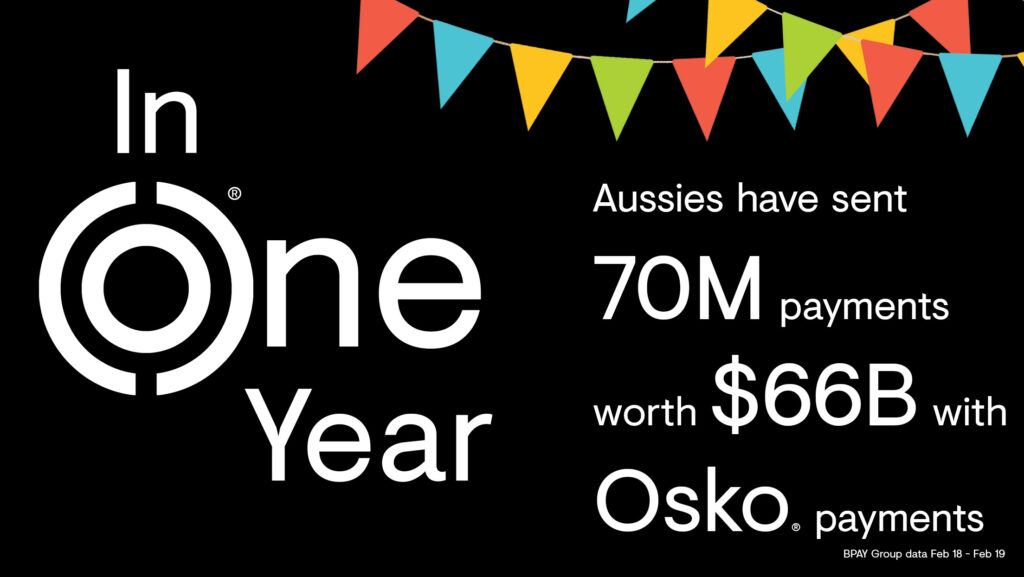
How Australians are using real-time payments 2
Osko by BPAY is the NPP’s first overlay service being used by consumers, businesses and fintechs. Since launching, Australians are enjoying the benefits of real-time payments and paying family and friends in under a minute, 24/7, even on weekends and public holidays.
“People transfer money at all times of the day – after dinner, on the weekends, at a footy match or cinema or even when buying something on Gumtree. Increasingly, they are expecting to access their money immediately. Most people will notice they have made an Osko payment when they get their payment receipt in online banking.” (Mark Williams, Chief Strategy Officer of BPAY Group.)
BPAY reports that Osko payments are not just limited to consumer to consumer transactions, with 30% of payments are to, or from, businesses and between businesses.
Mark adds: “Consumer expectations about how they pay and get paid are changing and we have been innovating to offer solutions that meet their needs. Osko Requests is in the pipeline, which will enable you to request a payment from within your online banking – making it much easier for someone to pay you back. We are also working to allow businesses to use Osko Requests and include documents such as invoices. So the NPP turns 1, is it too late to join the New Payments Platform?
The short answer is, of course, it’s not too late…yet. But savvy players in the industry recognise the importance of staying relevant in the face of digital disruption, and keeping the end-customer top of mind. If you are not providing the benefits of a simpler, faster and safe payment system to your customers, it’s likely a competitor or substitute will.
Find out More
Find out more about how Indue can help you participate in our new Real-time payments world.
1 Source Reserve Bank of Australia https://www.rba.gov.au/statistics/tables/
2 Source (OSKO by BPAY media release 13/2/19)
Related articles

5 reasons your business needs NPP today
The New Payments Platform Disruption: 5 reasons your business needs NPP today
Helen Flaherty, Senior Product Manager – New Payments Platform and Mobile Payments, Indue
Since launching in February 2018, the New Payments Platform (NPP) is proving to be one of the largest digital disruptors in the Australian banking landscape. Indue is one of the 13 founding members of the NPP initiative, which facilitates real-time settlements of payments with funds available in your account in less than a minute. Legacy payment channels such as cheques are being eclipsed by this innovation and it’s only a matter of time before it’s out with the old and in with the new. To avoid getting left behind, here are the top 5 reasons your business needs NPP today.
What are the Reasons Your Business Needs NPP?
Reason #1. It’s chequemate for cheques (and cash is no longer king)
Cheques have been in decline since 2006, and soon they’ll be gone for good. With an average annual decline of more than 20%, the New Payments Platform is putting the final nail in the coffin for cheques, further enabling our already cashless society. It won’t be long before there is an expectation every business has NPP – very similar to the expectation all businesses offer contactless payments. As with both of these innovations, the keyword is efficiency, with NPP set to generate an economic pay-off all round.
Reason #2. Time is money
Funds taking two or more days to clear will soon be a thing of the past. Real-time transfers will be the norm and fast payments will further reduce the need for cash. Not only does NPP help small businesses get paid faster, it improves cashflow for all businesses, enabling payments to be received in as little as 15 seconds. With 35% of payments in Australia now conducted on mobile devices, societal behaviours will continue to dictate the need to do everything in the palm of your hand, at the touch of a button.
Reason #3. The NPP is a safer bet
NPP is not any riskier than our current payments system. Legacy payment channels are less secure and offer greater potential for fraud. Nevertheless, real-time transactions mean non-repudiable payments and users still need to be protected. Unlike other payment methods, such as cheques and direct deposits, fraud prevention can occur in real-time, ensuring an enhanced experience and greater security for users.
Reason #4. The NPP is simpler
With NPP, gone are the days of worrying about putting in the wrong bank account or BSB number. The new PayID means businesses can make and receive payments by using just a phone number or email address. There’s no need to ask for bank account details, making the process faster, simpler and smarter.
Reason #5. The NPP’s Future is strong
Technological advancements have impacted the way we live and interact with each other, and the same technology is changing the world of payments. Our digital economy is already 24/7 and only NPP can meet its demands. The New Payments Platform enables faster, simpler and smarter payments and without adopting it or at the very least, planning to adopt it soon, your business risks falling behind.
At Indue, we help businesses harness the benefits of faster, safer, data-rich payment systems that make every-day payments easier. We are one of only eight participants which have launched the platform and through innovation, we are shaping the new face of Australian payments.
Our pioneering real-time fraud prevention solution is the first of its kind to be deployed in the Australian and New Zealand markets. It combines the expertise, security and anti-fraud bureau capability of Indue’s Orion Financial Crimes Centre of Excellence with IBM Safer Payments cognitive fraud detection solution.
As one of the founding members of the NPP initiative, you can trust Indue to get you real-time ready.
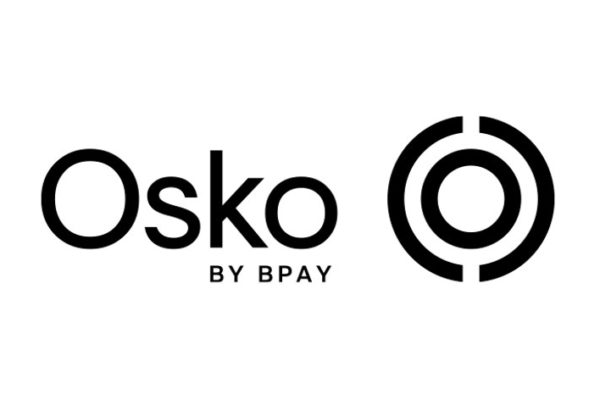
Ad Push on Big Bank Payments Innovation
Ad Push on Bing Bank Payments Innovation
The NPP has finally reached critical mass, with Westpac and ANZ rolling out access to customers after a six-month delay and triggering the launch of a national advertising campaign next week for the system’s first application, Osko.
Osko, which has been built by the major bank-owned BPAY Group, launched in February when the NPP was turned on and by tapping the NPP’s real-time clearing and data capability it provides instant account-to-account payments for the first time in Australia.
Over its first six months, more than $19 billion has been put through the service, which sits inside existing bank mobile applications, via more than 25 million transactions. But these numbers are set to surge now all four of the majors have turned it on.
The chief executive of BPAY Group, John Banfield, said Osko, is now operating inside the banking apps of more than 60 financial institutions and reaching over 42 million consumer and business accounts. “We are going full-steam ahead with a national advertising campaign,” he said.
This will begin on September 9 and include TV, outdoor, cinema and social media. The campaign comes as the banks attempt to restore public trust which has been tarnished by the revelations in the banking royal commission; through Osko, they plan to send a message around payments innovation.
While Commonwealth Bank and National Australia Bank have had Osko ready for customers for several months, the campaign has waited for ANZ and Westpac to resolve technical issues.
In March, there were 100,000 transactions going through Osko each day; this has jumped to 400,000 a day in recent weeks.
Come the end of the March next year, Mr Banfield said expect 1 million transactions a day and perhaps by the later part of next year volume could exceed the 1.5 million daily transactions put through BPay.
Open and Inclusive
Osko lets customers send funds using BSB and account numbers or a PayID, which can be an email address or mobile phone number. Around 1.9 million customers have created a PayID.
Most are using it for social payments to family or friends, with the average amount around $25. It is also being used for P2B payments, for example, for paying tradies. A new feature allowing payment requests to be made is in development.
It is expected Osko will be the first of many “overlay services” to be created on the infrastructure, which has been designed to be open and inclusive. Any one of Australia’s 150 prudentially regulated ADIs, and holders of the new restricted ADI licences, can connect directly to the infrastructure, but fintechs and non-banks can connect via payments service providers such as Cuscal, Australian Settlements Limited and Indue.
NPP Australia, the governing body, hopes the system will be used to facilitate real-time funding, new payments wallets, short-term lending, “buy-now, pay-later” offerings, the domestic legs of international remittance and new QR Code driven products. It may also be used to enable payroll payments, move data, and conduct payments using distributed ledger or blockchain technology.
The Reserve Bank forced the banks to fund the infrastructure, which was built by global giant SWIFT. The system will be showcased by SWIFT as part of its SIBOS conference, which will see many of the world’s top payments executives descend on Sydney in October.
The Productivity Commission in its recent report on competition in financial services called for a formal access regime to be established over the NPP to facilitate competition, but this has been rejected by the Reserve Bank’s Payment System Board, and NPP Australia, which say more time is required to see how enhanced access and innovation plays out. NPP Australia is planning on extending the capability of the system to support new payment types, including alternatives to the current direct debit system.
Source: AFR Monday 3rd September, 2018
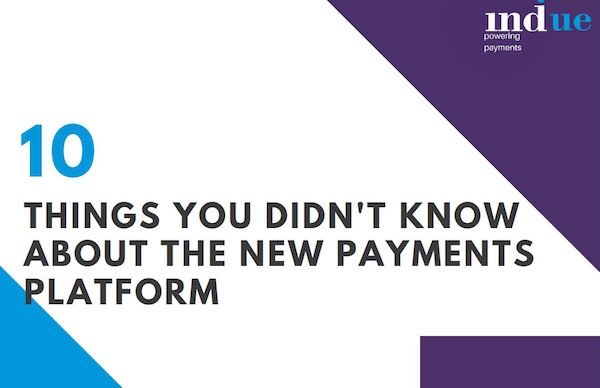
10 Things you didn’t know about the NPP
10 Things you didn’t know about the NPP
With so much hype continuing to surround the New Payments Platform (NPP), Australia’s newest payment platform, you may like to find out ’10 things you didn’t know about the NPP’.
Over the past few years, since the decision was made to introduce the New Payments Platform into Australia, the Indue team has worked tirelessly with all our customers to deliver for them a real-time payments experience.Learn more today:
We welcome you to download and share our NPP presentation, and to find out more about how you can participate in our new real time payments world.

New Payments Platform Initiative | Your Ticket To Play
Derek Weatherley, Indue CEO explains how the New Payments Platform is ‘your ticket to play’ in the new payments environment with speed, simplification, and data richness a few of the many benefits being delivered.
The New Payments Platform initiative (NPP) is an exciting industry initiative that delivers a dynamic new payments infrastructure to meet the growing demands of Australia’s 24/7 digital economy.
The New Payments Platform Initiative: Real-time Payments are Here
The introduction of the New Payments Platform initiative means your customers can now make and receive payments in real time using a PayID between participating financial institutions.
Indue has enabled many ADIs (Authorised Deposit Taking Institutions), including a mix of credit unions , banks and neo banks to offer NPP, Australia’s newest digital payments capability, to their customers.
It provides Australian consumers with a faster, safer, data-rich payments system for making everyday payments easier. Indue is one of only 8 directly connected participants who have launched. We offer a comprehensive agency solution to get you real-time ready today.
Watch The Video
For More Information on the New Payments Platform
Click here to find out more information about how Indue can help you participate in our new real time payments world.w]

Faster Payments UK 10th Anniversary Insights
Faster Payments UK 10th Anniversary Insights
Payments will increasingly be triggered by smart devices in the next decade, with people needing to oversee them only minimally, the report predicts. Rapid changes to the way we pay could see households’ fridges automatically ordering and buying weekly essentials like milk when they run out, according to a UK report.
The predictions were made to mark 10 years on Sunday since the launch of the “real-time” Faster Payments service in the UK which allows people to send and receive money in an instant.
The service launched on May 27 2008 – and since then more than 9.1 billion payments worth a total of over £7 trillion have been sent.
More than 230,000 faster payments are sent every hour, on average, according to the service.
The Changes That Have Already Happened
It said changing consumer behaviour has driven changes such as the growth of internet and mobile banking, making the convenience of 24/7 instant payments part of everyday life in the UK.
The report, co-authored by strategic consultancy Hunch, set out the impact of real-time payments over the past decade, alongside predictions for the future, with payments being triggered by smart devices.
It looked at what the world of payments will look like in 10 years’ time.
Seismic Shift Coming
The report, titled A Decade Of Faster Payments, said the world of payments is about to undergo another “seismic shift” amid the “ever increasing digitalisation and automation of the economy”.
It said: “Increasingly, machine-to-machine payments will take place securely and with only minimal permissions-based human oversight.”
Philip Clarke, founding partner of Hunch, said: “The future of real-time payments will let your fridge order and pay for your weekly essentials when they run out, and your home sell energy back to the grid when you’re not in.
“This ‘economy of things’ will transform the commercial landscape with new behaviours, new expectations and new business models that change the way we buy, provision and use an emerging generation of products and services.”
John Jefferson, general manager of Faster Payments UK, said: “The convenience and simplicity of being able to send a near instant payment 24 hours a day, seven days a week has seen the popularity of Faster Payments soar in the 10 years since it launched.
“We are proud to have kept our service available around the clock since 2008, and look forward to meeting the predicted growing demand from consumers and businesses for the next decade and beyond.”
How Payments Have Changed in The UK
Here are some key milestones since the Faster Payments service was launched a decade ago in the UK:
- 2008: The first faster payment is sent on May 27
- 2011: The billionth faster payment is made, at 11am on May 24
- 2012: 811 million faster payments are made – up 50% year-on-year
- 2013: One billion faster payments are sent in the year
- 2014: Mobile payments service Paym is introduced to help people pay using a mobile number rather than needing to know someone’s bank details
Source: Mirror UK Vicky Shaw, 25th May, 2018

